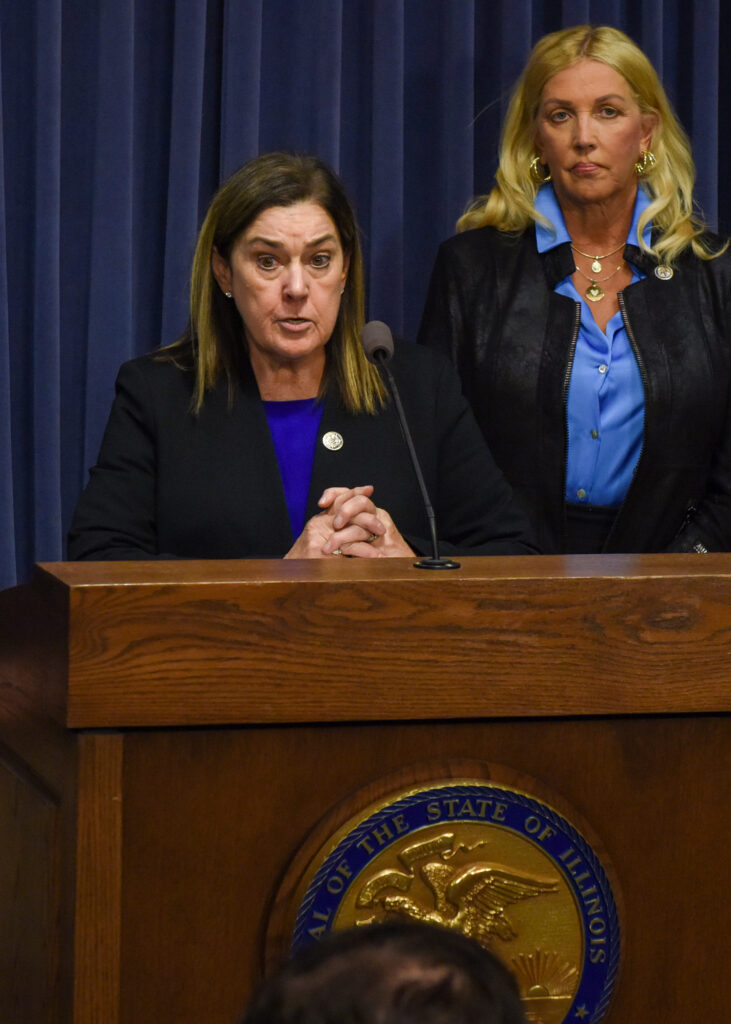Advocate for legislation that would leave more money in citizens’ pockets

Springfield, IL…Families and seniors throughout Illinois are finding it difficult to make ends meet as high inflation and other economic pressures impact their bottom line, which is why members of the Senate Republican Caucus are reinforcing their legislative priorities to provide much-needed relief for Illinoisans. State Senators Sue Rezin (R-Morris), Jil Tracy (R-Quincy), Don DeWitte (R-St. Charles), and Erica Harriss (R-Glen Carbon) came together in the Capitol press room March 30 to advocate for solutions to the economic issues facing Illinoisans.
“Last year, the Majority had a chance to provide permanent, meaningful financial relief to families. Instead, we left session with one-time, temporary gimmicks just ahead of a large General Election. Most of that ‘relief’ has already come and gone, yet families are arguably in an even worse financial spot than they were a year ago,” said Sen. DeWitte. “Families continue to struggle with increased grocery costs, higher inflation and interest rates, and a possible looming recession. That’s why we are here to discuss what we believe can be bipartisan solutions to provide relief for Illinois families.”
Sen. DeWitte has filed Senate Bill 1150, which makes the one-year state sales tax exemption for groceries permanent and also exempts prescription drugs and other medical devices from state sales tax beginning July 1, 2023.
In addition to families struggling to put food on the table, those with young children are also dealing with high childcare costs. Sen. Tracy has proposed Senate Bill 1151/Senate Bill 168, which would provide parents with a state tax credit equal to 25% of the federal tax credit for each qualifying child. Under the proposal, qualifying families would receive a tax credit of up to $500 per qualifying child when they file their state income taxes.
“The challenges of the last couple of years have also been particularly devastating for parents struggling to find affordable and reliable childcare for their children. Unfortunately, that burden has disproportionately impacted women who lost their jobs at a much higher rate than men during the pandemic. If we want to grow our workforce in Illinois, we must grow our opportunities for quality, affordable, and accessible childcare,” said Sen. Tracy.
Another impact of the hard economic pressures is the rising cost of energy. A proposal from Sen. Harriss would provide $200 million in energy rebates for Ameren customers. The program was initially established last year, but funds were never appropriated. Sen. Harriss’ Senate Bill 2200 would provide each household with about $170 in credits on their power bills.
“The soaring cost of constituents’ utility bills, some of whose rates increased by as much as 90 percent, is one of the biggest challenges many downstate districts face right now. This appropriation would provide relief to families immediately while we continue to work toward energy solutions that bring down costs in the long-term,” said Sen. Harriss. “This an issue with bipartisan support. Let’s work together to get it done.”
During Thursday’s press conference, Senate Republicans also discussed Senate Bill 1152/Senate Bill 330, proposed by Senator Rezin, which would increase Illinois’ income tax exemption for seniors from $1,000 to $2,000.
“While everyone is struggling with rising costs, our seniors on fixed incomes are particularly vulnerable during periods of high inflation,” said Sen. Rezin. “Doubling Illinois’ current Senior Income Tax Exemption will provide the seniors who call Illinois home with desperately-needed extra income as they try to pay for critical necessities, like food, drugs, and other expenses.”
As the spring legislative session continues, Senate Republicans hope to see bipartisan progress on these critical issues to improve the lives of people of all ages and in all stages of life who call Illinois home.
